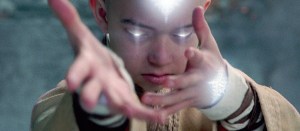10 Things Laverne Cox and the Creators of Doubt Revealed About the New Legal Drama
New CBS series stars Katherine Heigl as a lawyer falling for her client on trial for murder. Plus: The one thing Laverne Cox would never say in real life.

As long as there’s been television, there have been lawyer shows. Though crime may evolve, it isn’t going away, so legal series creators will never run out of material.
New CBS series Doubt focuses on defense attorneys and attempts to bring a modern perspective to modern issues. Law & Order is ripped from the headlines. Doubt is creating new headlines.
Katherine Heigl plays Sadie Ellis, a defense attorney defending Billy Brennan (Steven Pasquale) for murder, and falling for her client. That case will take the whole season, but Sadie’s partners Albert (Dule Hill), Cameron (Laverne Cox), and senior partner Isaiah Roth (Elliott Gould) defend new cases every week, with the help of associates Tiffany (Dreama Walker) and Nick (Kobi Libii).
Cox and series creators Tony Phelan and Joan Rater spoke with Rotten Tomatoes ahead of Doubt‘s premiere — here are 10 things they told us about the show’s cases and relationships.
1. WHAT CAMERON SAID THAT LAVERNE COX WOULD NEVER SAY

In the premiere episode, Cameron visits her client, Lester, in jail. The young man doesn’t react very sensitively to a trans woman and asks if she was a man. Cameron tell him she used to be a man, and Cox explained why she would never say that in real life.
“First of all, Laverne would never say, ‘I used to be a man,’” Cox said. “I would never say that. Laverne would say that I was assigned male at birth, but I always knew that I was a girl and my journey was about accepting that and taking the steps to live more authentically. Lester wouldn’t have understood that. I thought Cameron in that moment to Lester would say that to say it in a way he would understand and also to get to the very next part, ‘Do you still want me to represent you? Because if so, we have work to do.’”
2. DOUBT IS FUN

When handling serious cases, Doubt gives them the respect they deserve. The rest of the time, at the office or in the lawyers’ personal lives, Doubt is fun. They joke and flirt and complain, like real people do at work. Some of the cases are fun too. One episode goes to court over dog poop.
“It gets blown up out of proportion because the two attorneys involved know each other and are enemies,” Phelan said. “We’re defending the guy who’s walking his dog who’s like, ‘That’s not my dog’s poop. It’s another dog’s poop. My dog likes to poop around his stoop, I don’t deny that, but I always clean it up.’”
Another case is about a website for cannibal fantasies. “It’s a First Amendment thing,” Rater said. “She writes stuff about eating her coworkers, but she doesn’t act on it.”
3. CAMERON IS A SUPERHERO LAWYER

Cameron is not just a lawyer. She’s a superhero, and Cox has the same super power in real life.
“Joan said to me that Cameron’s superpower is that she has a tremendous amount of empathy for her clients,” Cox said. “She’s able to convey the empathy with immense clarity to jurors, to a judge, to a courtroom. I think I’m a good listener in real life. I think I’m good at feeling what other people feel. That’s what actors do in general.”
4. SADIE AND ALBERT MAKE EACH OTHER BETTER

Sadie and Albert are all business in the courtroom, but back at the office they are just like any other best friends. They feud and bicker, but push each other to step up.
“I think their friendship is kind of the heart of the show,” Rater said.
Phelan added, “Like all best friends, they just know the buttons to push on the other person.”
5. CAMERON HAS A VERY REAL TRANS LOVE STORY

Look for Ben Lawson to recur as Peter Garrett, an old friend of Cameron who knew her before her transition. Sparks fly, and they get to explore issues that are very real to the trans community.
“I love this storyline,” Cox said. “I’ve always wanted to see, on television or in a movie, the reality of what it means to be a trans woman dating straight-identified men, because I’ve lived that reality. Of course he has issues. There would be no drama if he didn’t have issues. What’s really exciting is that he does pursue Cameron. I would say she’s apprehensive about his motivations, and his motivations are not clear. There are many obstacles to their relationship. There are so many moments that felt really true to things I’ve lived in my own life.”
6. RAPE CASES CHALLENGE THE DEFINITION OF CONSENT

When Doubt gets serious, it asks provocative questions. In one rape case, Sadie defends a man who is still sleeping with his wife even though she has Alzheimer’s. His stepchildren sue him for rape, believing their mother can no longer consent.
“I think it’s certainly in the culture right now,” Phelan said. “What is consent? Does consent need to be continually given? It’s trickier when it’s a husband and wife and there are family tensions and dynamics within that that complicate it. If we do our job right, you the audience are going to be going back and forth about how you feel about the case.”
In a college rape case, a rape victim wears a sandwich board branding her attacker as a rapist. The accused rapist then sues her for libel.
“I thought what was interesting was this whole idea of somebody who had availed herself of the means of redress in the school itself, the police and DA’s office and did not find justice in either place,” Phelan said. “So the sandwich board was her last resort.”
7. DOUBT TRIES EQUALITY CASES TOO

Some of the cases in Doubt episodes address very modern racial issues. Cameron gets a case where a 16-year-old African-American’s graffiti charge is escalated to resisting arrest by police.
“A kid who’s arrested for tagging from a really great family, who’s on a track to go to college, who’s a straight-A student, but just happens to do some graffiti — his life can be changed forever with a felony conviction,” Cox said. “All of a sudden he’s another black boy being criminalized.”
Cox said the episode struck a chord with her in light of the Black Lives Matter movement.
“That episode was really rough for me, because it goes into a lot of the fears that young black men have around interacting with the police,” she said. “We’ve seen on tape, at this point, hundreds of times black people being murdered by police. So that case, when I read it, I remember crying, and I remember feeling like that was a case that was really important and a story that was really important for us to tell. That was major.”
8. DISCOVERY GETS AS MUCH SCREEN TIME AS THE COURT ROOM

Most legal shows focus on the courtroom. That’s where the lawyers get to make their dramatic speeches. In real law, they and their staff have to spend hours upon hours going through discovery. Doubt goes there. Tiffany and Nick are often the ones saddled with sorting through boxes of files.
“We have another case where there are basically four years of audio tapes of sessions with a therapist,” Phelan said. “You actually need the manpower to have people to have people sit down and listen to four years of audio tapes, because you don’t know what you’re going to find.”
Rotten Tomatoes did the math: At one hour a session, that’s over 200 hours of audio. (Imagine the legal fees!)
9. CAMERON GETS A BIG CASE NEAR THE END OF THE SEASON

For most of the season, Sadie is on the big case trying to defend Billy week to week. She sometimes has time to defend a one-off case, but it’s usually Cameron who gets the cases of the week. Until, that is, Isaiah picks her for a big one.
“There’s a case later on for Cam that Isaiah gives her but it’s really pivotal for the whole season,” Cox said. “It’s probably the biggest case that Cam has to try because it’s personal. It actually goes over more than one episode, probably over four episodes towards the end of the season.”
10. THE TITLE WASN’T AN ISSUE

Movie buffs know Doubt as the title of a 2008 movie, based on the play, which earned Oscar nominations for Meryl Streep, Phillip Seymour Hoffman, Amy Adams, and Viola Davis. Rater said naming the show Doubt was never an issue.
“There were a number of titles bandied about,” Rater said. “This one just felt it represented the gray areas that we wanted to talk about in the show the best.”
Doubt premieres Wednesday, February 15 at 10/9C on CBS






